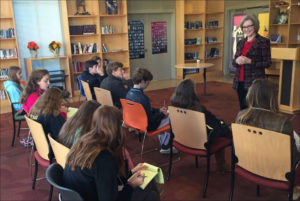
In the 15 years Brendan Folmar has worked at the John G. Wood School, a private day school for emotionally handicapped children, he has witnessed a disturbing change in the kind of children admitted to the school.
When he first joined the Wood School staff, many of students were comparable to students today who are mainstreamed in Virginia public schools. Today the condition of students at Wood, says Folmar, the school principal, is more acute and more challenging to treat than ever.
“They’re not sending us cream puffs,” said Folmar of the public schools that assign children to Wood when all in-house remedies — mainstreaming, assigning special assistants, teaching in self-contained classrooms, and the like — have failed. “They’re placing kids who are younger and younger and have more severe behavior problems.”
Almost all of the children at Wood School and the affiliated Home for Girls and Boys, a residential community in the same wooded suburban complex in Henrico County, experienced physical abuse, emotional abuse, or sexual abuse as young children. Early childhood trauma affected them deeply, literally rewiring their brains, creating fight-or-flight impulses that can trigger emotional outbursts and violence.
As Folmar and Virginia Home for Girls and Boys President Claiborne Mason guided me through the campus on a recent snow day, the school was mostly empty. But I had a chance to meet several kids, who seemed like typical happy-go-lucky teenagers. But appearances can be deceiving. As we strolled down one hall, we happened upon the campus handyman who was cleaning up a plate-glass window that a student had kicked and shattered only a day or two previously.
“Young people are struggling more than ever,” Mason said. “Most suffer from severe depression. Most have been hospitalized several times [in psychiatric units] before they come to us.”
The Home for Girls and Boys and the Wood School provide a sheltered environment not just to help kids make up lost ground academically but learn life skills, learn trust, learn emotional self-control, and learn how to deal with everyday challenges of life. Helping shattered kids rebuild their lives is an expensive business. The Wood School has 25 staff for 45 children — a ratio that public schools could never hope to match. Only half the funds to operate the school come from the state. The rest comes from private philanthropy. It’s not a model that society can hope to replicate on a large scale.
But replication on a large scale seems to be what is needed. I came away from my visit impressed by the dedication, compassion and passion of everyone I met. But I also came away profoundly dispirited by the enormity of the challenge posed by the rising generation of broken children. To put it bluntly, our public schools and philanthropic institutions are being overwhelmed.
If you’re not a parent of a child with disabilities or an educator in the school system, you don’t hear much about this. People don’t brag at cocktail parties about messed up their kid is and the struggles they have finding help. News coverage emphasizes heart-warming success stories or focuses on fragments of the problem like the rise of autism, attention deficit disorder, or opioid addiction. Schools cry out for more money but schools have always cried out for more money, and there is so much evidence of mismanagement that many people tune it out.
But the problems are real, and systemic, and there is abundant anecdotal evidence to suggest that they are getting worse. Virginia is experiencing a social crisis the magnitude of which is not sufficiently appreciated. Over the next few weeks, I’ll be digging into the numbers to get a handle on the size, scope and origins of the crisis.

Leave a Reply
You must be logged in to post a comment.